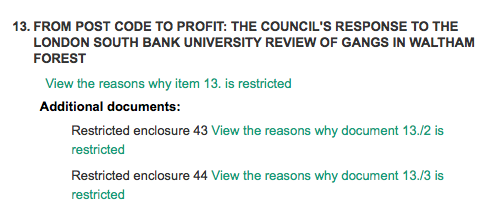LBWF’s refresh of its Gang Prevention Programme: spin, spin, and more spin?
It is abundantly evident that many people in the borough, from many different backgrounds, are worried about the seemingly unchecked level of local gang-related crime, and the grave impact that this is having on young people’s lives.
It is therefore astonishing that those who turned to LBWF’s website yesterday in order to find out what the Cabinet is intending to do about gangs found themselves greeted by the following:
Certain aspects of anti-gang work – for example, active police operations – of course must be kept largely confidential.
But yesterday’s discussion was about the direction of LBWF policy, and the resources to be expended, in other words the kind of things that taxpayers, and, more important still, those whose lives are currently being blighted by the threat or reality of violence, have every right to know about.
In mitigation, LBWF states that it is briefing selected journalists today, and so no one is ultimately being short-changed.
However, this is unconvincing, because after all, if the unvarnished truth was witheld from the public yesterday, why should it be revealed to journalists today?
It is difficult not to conclude, therefore, that at bottom LBWF is involved in a PR exercise, aimed at hiding bad news, and over-accentuating the positive.
This is a great pity, because what the borough needs now more than ever is some straight talking, involving the largest possible cross-section of residents, and this is unlikely to happen if one of the major institutional players is so obviously enamoured of silly games.
Coincidentally, evidence surfaces that our old friend the Waltham Forest Safer Neightbourhoods Board (WFSNB) – the forum where LBWF, the police, and local residents are supposed to meet and set priorities – still has not got its house in order.
One source of tension is membership, with grass-roots activists anxious that they are being frozen out, and wider fears that elements of the previous leadership, despite past failures, are trying to resurrect some sort of vetting procedure under their control.
Another is the fact that though three councillors have been appointed to the WFSNB, none has much known expertise in anti-gang work, which gives the impression that this is just another example of buggins’ turn.
Finally, there are inevitable concerns about funding. In previous years, the Mayor’s Officer for Policing and Crime (MOPAC) granted the WFSNB tens of thousands of pounds of public money to run projects in the borough, but only a small proportion of this was fully accounted for.
Subsequently, in February 2018, and after questioning by this blog, MOPAC stated unequivocally that it would not release any further monies to the WFSNB ‘until the outstanding [monitoring] forms have been submitted’.
Now, as a new MOPAC funding round beckons, the distinct possibility is that WFSNB’s hapless record will count against it.
All in all, this is not a happy prospect for those who want to see an effective gang prevention programme in the borough, and local residents of all ages fully integrated.

